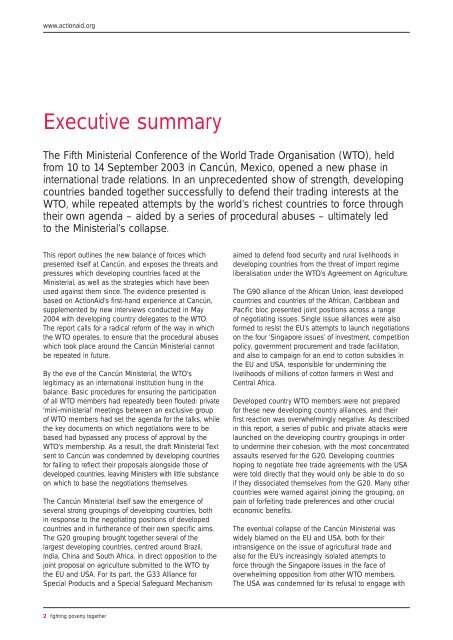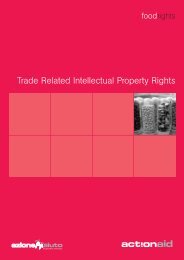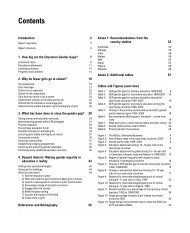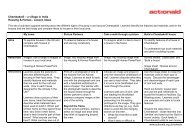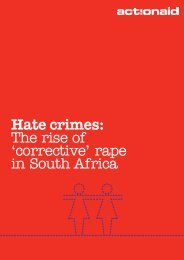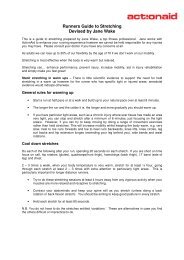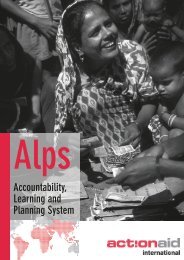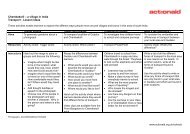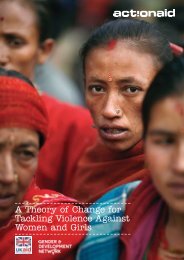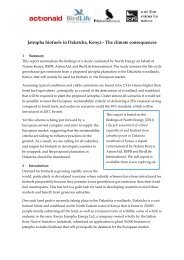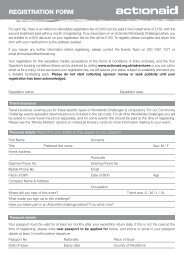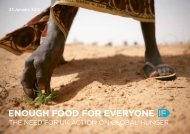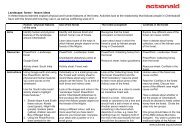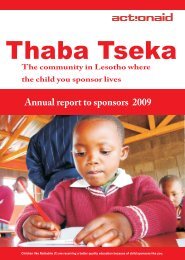Divide and Rule: - ActionAid
Divide and Rule: - ActionAid
Divide and Rule: - ActionAid
Create successful ePaper yourself
Turn your PDF publications into a flip-book with our unique Google optimized e-Paper software.
www.actionaid.orgExecutive summaryThe Fifth Ministerial Conference of the World Trade Organisation (WTO), heldfrom 10 to 14 September 2003 in Cancún, Mexico, opened a new phase ininternational trade relations. In an unprecedented show of strength, developingcountries b<strong>and</strong>ed together successfully to defend their trading interests at theWTO, while repeated attempts by the world’s richest countries to force throughtheir own agenda – aided by a series of procedural abuses – ultimately ledto the Ministerial’s collapse.This report outlines the new balance of forces whichpresented itself at Cancún, <strong>and</strong> exposes the threats <strong>and</strong>pressures which developing countries faced at theMinisterial, as well as the strategies which have beenused against them since. The evidence presented isbased on <strong>ActionAid</strong>’s first-h<strong>and</strong> experience at Cancún,supplemented by new interviews conducted in May2004 with developing country delegates to the WTO.The report calls for a radical reform of the way in whichthe WTO operates, to ensure that the procedural abuseswhich took place around the Cancún Ministerial cannotbe repeated in future.By the eve of the Cancún Ministerial, the WTO’slegitimacy as an international institution hung in thebalance. Basic procedures for ensuring the participationof all WTO members had repeatedly been flouted: private‘mini-ministerial’ meetings between an exclusive groupof WTO members had set the agenda for the talks, whilethe key documents on which negotiations were to bebased had bypassed any process of approval by theWTO’s membership. As a result, the draft Ministerial Textsent to Cancún was condemned by developing countriesfor failing to reflect their proposals alongside those ofdeveloped countries, leaving Ministers with little substanceon which to base the negotiations themselves.The Cancún Ministerial itself saw the emergence ofseveral strong groupings of developing countries, bothin response to the negotiating positions of developedcountries <strong>and</strong> in furtherance of their own specific aims.The G20 grouping brought together several of thelargest developing countries, centred around Brazil,India, China <strong>and</strong> South Africa, in direct opposition to thejoint proposal on agriculture submitted to the WTO bythe EU <strong>and</strong> USA. For its part, the G33 Alliance forSpecial Products <strong>and</strong> a Special Safeguard Mechanismaimed to defend food security <strong>and</strong> rural livelihoods indeveloping countries from the threat of import regimeliberalisation under the WTO’s Agreement on Agriculture.The G90 alliance of the African Union, least developedcountries <strong>and</strong> countries of the African, Caribbean <strong>and</strong>Pacific bloc presented joint positions across a rangeof negotiating issues. Single issue alliances were alsoformed to resist the EU’s attempts to launch negotiationson the four ‘Singapore issues’ of investment, competitionpolicy, government procurement <strong>and</strong> trade facilitation,<strong>and</strong> also to campaign for an end to cotton subsidies inthe EU <strong>and</strong> USA, responsible for undermining thelivelihoods of millions of cotton farmers in West <strong>and</strong>Central Africa.Developed country WTO members were not preparedfor these new developing country alliances, <strong>and</strong> theirfirst reaction was overwhelmingly negative. As describedin this report, a series of public <strong>and</strong> private attacks werelaunched on the developing country groupings in orderto undermine their cohesion, with the most concentratedassaults reserved for the G20. Developing countrieshoping to negotiate free trade agreements with the USAwere told directly that they would only be able to do soif they dissociated themselves from the G20. Many othercountries were warned against joining the grouping, onpain of forfeiting trade preferences <strong>and</strong> other crucialeconomic benefits.The eventual collapse of the Cancún Ministerial waswidely blamed on the EU <strong>and</strong> USA, both for theirintransigence on the issue of agricultural trade <strong>and</strong>also for the EU’s increasingly isolated attempts toforce through the Singapore issues in the face ofoverwhelming opposition from other WTO members.The USA was condemned for its refusal to engage with2 fighting poverty together


